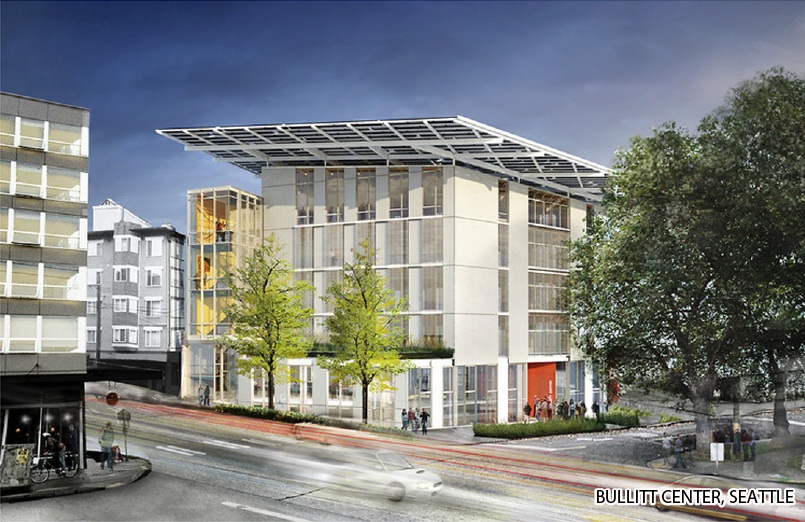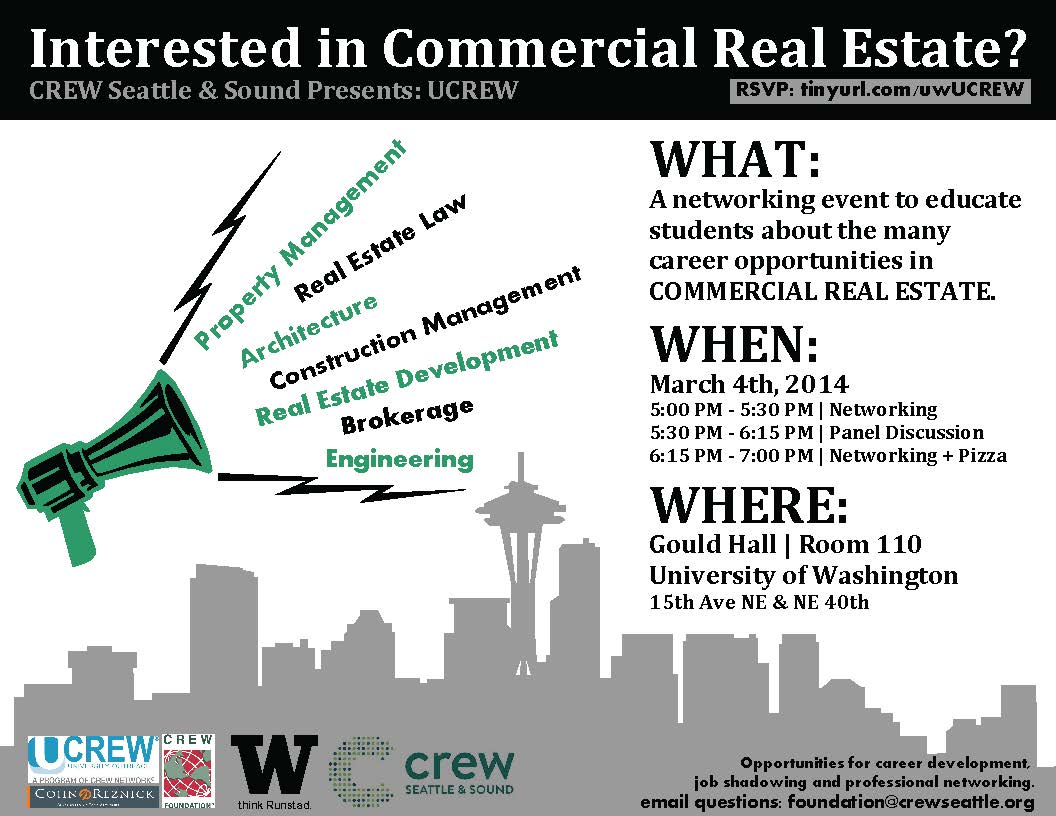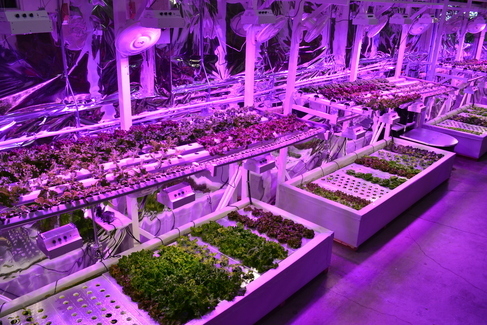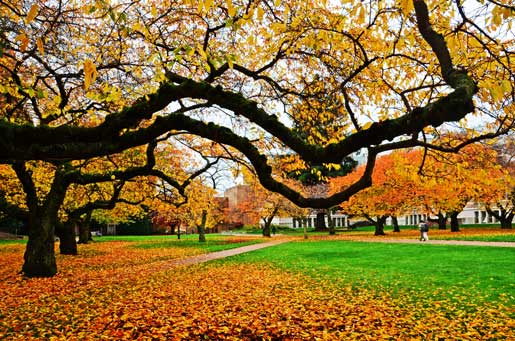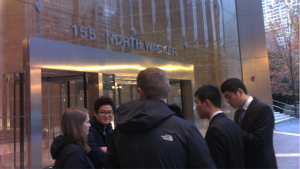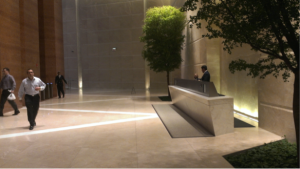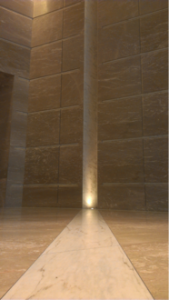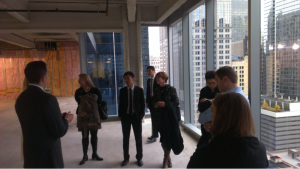First year MSRE student Patrick Kassin has been blogging about the many visits he and his fellow students have been making to sites around Seattle, and their conversations with the many Runstad Center board members, mentors, and friends they meet. These inside tours of the real estate “real world” are an invaluable complement to work done in the classroom. Seattle has an incredibly rich and varied market, and the Runstad Center is fortunate to have close connections to the major players in the industry that shapes it. One of the biggest assets to our program is how readily available these individuals make themselves so our students can learn from their experience and expertise. Check out Patrick’s blog for the full report!
Category: MSRE
Evolution Projects visits the Runstad Center
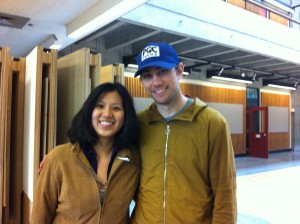
MSRE 2013 alumna Ji Shon returned to Gould Hall yesterday along with her colleague Chad Dale, partner in Evolution Projects, for a brown bag lunch session with our students. Ji completed a dual MSRE/M.Arch degree last year and is now doing both design and development work for Evolution. Chad is a partner is the famed Seattle restaurant The Walrus and the Carpenter, and has developed a great deal of expertise on the real estate aspects of restaurant development, adaptive reuse, and a host of other topics. Evolution Projects is the development arm of the Fremont based outdoor retailer “evo” (evolution Innovations), which strives to bring values around “commerce, cause, culture and community” to all of their development projects. This was a wonderful opportunity to hear about cutting edge work being done by a small, innovative development team – just the kind of work so many of us would like to be associated with and live down the street from. Our thanks to Ji and Chad for answering our students’ questions and joining us for an engaging discussion!
Christopher Leinberger lecture available online
Christopher Leinberger presented a fascinating picture of the Walkable Urban Future of Metro Seattle at the Dean’s Distinguished Lecture on February 12. If you couldn’t be there in person, you can enjoy the lecture right here, right now! Our thanks to the UW College of Built Environments staff for recording it and making it available to all.
New spring quarter course in Green Building
The Runstad Center is pleased to announce a new Spring 2014 course offering:
RE 598: Green Building Law & Risk Mitigation
Tuesdays/Thursdays, 7 – 8:20 pm (3 credits)
Gould 440
Instructor: Nicole DeNamur, JD & LEED Green Associate
This multidisciplinary course will focus on the intersection of green, high performing buildings and the law. Topics will include:
- Systems and standards for defining “green” and the impacts of this definition.
- Federal, state and local regulatory landscape.
- Assessment of risks and risk mitigation tools.
- Professional liability, financing, and insurance.
- Environmental and social justice issues.
Students will learn to identify and understand the risks and challenges presented by high-performing buildings, and analyze frameworks and strategies to manage and overcome these challenges. This course is designed to prepare future sustainability leaders for the issues they will encounter as this area continues to evolve and become increasingly regulated.
Questions about enrollment? Email msre@uw.edu.
You’re invited to UCREW: March 4, 2014
The Runstad Center for Real Estate Studies & Commercial Real Estate Women present: UCREW!
Tuesday, March 4, 5-7pm
Gould Court
Are you interested in the real estate industry? If yes, this event is for you. If not, this event is also for you. Because whether you’re in planning, finance, construction management, design, HR, engineering, philosophy or… any discipline, the industry has something for you. How about customer service, project management, research, green building and sustainability… there are endless possibilities for you to explore and apply your interests in real estate.
CREW Seattle & Sound has partnered up with The Runstad Center for Real Estate Studies to host a fantastic event, UCREW, to be held on Tuesday, March 4, from 5 – 7pm in Gould Hall. This event features an interactive panel session with high-profile speakers representing a wide range of fields, along with professional networking as well as opportunities for job shadowing and mentoring. RSVP now!
While CREW seeks to promote the advancement of women in the industry, this event is by no means only for ladies. Anyone who is a supporter of the mission is welcomed!
Liz Dunn on the evolution of neighborhoods
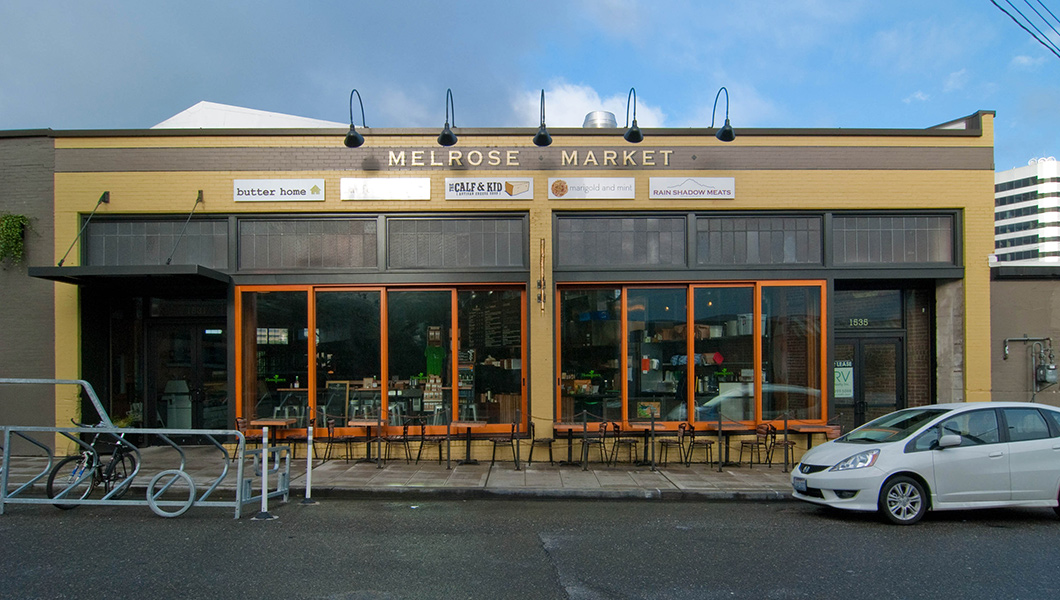
Liz Dunn, part of the 2011 class of Runstad Center Affiliate Fellows, was interviewed by BUILD llc for Arcade magazine, in a conversation about “neighborhoods that fire on all cylinders.” She talks about teaming up with Dave Miller (founding partner of Seattle’s esteemed Miller Hull Partnership, and chair of the UW Department of Architecture) to get her company’s first project off the ground, building trust with lenders, concern for the well being of neighborhoods, and how she measures both progress and success. She also shares her own definition of sustainability, and new strategies for design and development. Read the full article here.
MSRE ’13 alum Zach Clements is an asset manager and financial analyst on Liz’s team at Dunn + Hobbes. The company specializes in the adaptive reuse of existing buildings as well as the construction of new urban infill projects.
Runstad alumnus grows new food industry concept
MSRE ’12 alumnus Chris Bajuk has been receiving lots of media attention lately for his environmental agriculture startup, UrbanHarvest. Bajuk has partnered with The Millionair Club, a leading Seattle charity, building a 250 square foot hydroponics system in the basement of their large Belltown facility, with the goal of harvesting some 20,000 bowls of salad a year. The program will provide fresh produce for sale to local stores and restaurants, as well as supply homeless individuals and families with donated fresh produce. It will also create job training and employment opportunities in urban farming to participants in the Millionair Club’s jobs program.
The new venture has been widely covered by local media, including KOMO News, KING5 News, Puget Sound Business Journal, and the Seattle Daily Journal of Commerce.
The 93-year-old Millionair Club charity provides employment opportunities, meals and other social services to thousands of people a year. UrbanHarvest, founded by Bajuk in 2012, operates on an ethic of “people, planet, profit” — meaning that in addition to being financially sustainable, the company focuses equally on positive benefits for employees, consumers, and the environment. UrbanHarvest won top honors in the University of Washington’s annual business plan competition, and hopes to bring a new type of farming to rooftops – and basements – across Seattle and beyond.
First year students meet with local mentors
While our second-year students were in Chicago for the ULI fall meeting, our first-year students were busy meeting with some heavy hitters in the local real estate community. Patrick Kassin shares some choice tidbits on his blog about the students’ tour of Stadium Place with Kevin Daniels, and Lei Wu writes in with an account of her conversation with Bob Wallace of Wallace Properties. Past, present, and future MSRE students would do well to take note of the valuable insights which Lei learned and wishes to share with other young professionals entering the field.
Thank you to all of these talented mentors for so generously sharing their time and wisdom with our students!
A Mentor’s Tips for Real Estate Industry New Professionals
Contributed by Lei Wu, November 10, 2013
Bob Wallace and I met at a NAIOP mentoring event on October 23, 2013. During our brief conversion, I learned that Bob is the CEO of Wallace Properties, which has been an influential real estate company in the Puget Sound region since the 1970s. Its projects are regular features on news media, such as the Puget Sound Business Journal. As successful as he is, Bob seems very down to earth and humble. I yearned to learn about more about him and his recipe for success. Maybe there is an ingredient or two that a newbie like me could borrow right away, which would start me off on the right foot. As swarms of mentees surrounded him at the event, I decided that a separate meeting with Bob later would be the way to go.
Bob generously agreed to meet with me on a sunny Friday morning. Our one and a half hour conversation was filled with stories of fun and wisdom. The recipe that I was looking for emerged through these stories. The two biggest ingredients that I have heard from these stories are: 1) focusing on your strengths and 2) giving back to the community.
Focus on your strengths. Between two potentially good career options: healthcare management consulting and real estate, Bob made the decision to focus on the latter early on. As Wallace Properties developed into a full-blown commercial real estate company over the years, focusing on strong areas allowed the company’s reputation to develop concurrently with growth. However, the areas that Bob has delegated for outside help are probably as significant as opportunities he has taken on. For example, Wallace Properties does not provide residential property management because this area is not regarded as one of its strengths. What does it do for its own multi-family properties? It hires good residential property management companies.
Give back to the community with what you are good at. “I sort of understand finance and real estate. Those are areas in which I have tried to give back to the community.” Bob’s efforts in a list of diverse community organizations show the point of his words. One example is his involvement as the past chair of the Major League Baseball Public Facilities District, also known as Safeco Field. Another example is Bob’s efforts with Puget Sound Air Transportation Commission as its chair. A quote that Bob used in emphasizing his point is ”we spend too much talking with ourselves.” You do not have to be a chair in order to get involved meaningfully in a community organization. Bob noted a success story about a young professional, who has been active in community organizations. Apparently, her active community involvement has helped her get to know and work with people. Not surprisingly, she does very well in her professional career.
Now, I have shared my learning from one mentor. I hope you can put it to good use in your future successes.
Maintaining your GRADitude
If you’re considering an advanced degree or are currently in the midst of earning one, you are probably well aware of the sacrifice and hard work it will take to achieve your goals. How do you keep your eye on the end result of your efforts, while also remaining present in the moment and appreciative of your time as a student? Here is a thoughtful and timely piece with three key suggestions to help you “maintain your GRADitude.”
We at the Runstad Center would like to wish everyone in our community — our students, alumni, board, job and internship sponsors, university network, friends far and wide — a very happy Thanksgiving!
More from Chicago – and its newest skyscraper
MSRE ’13 student Eric Hadden writes in with another report from our students’ recent trip to Chicago for the ULI 2013 Fall Meeting. Read on to hear all about their trip to 155 Wacker, Chicago’s newest office tower.
As a part of last week’s ULI events, Runstad Students received an exclusive invite to tour Chicago’s newest office tower, 155 North Wacker. Our hosts from John Buck Co. took us behind the scenes of this Class A+ office tower and explained the process of developing this project in the middle of the Great Recession.
From blocks away, it is apparent that 155 North Wacker is exceptional, as it rises above the structures around it. The grand entry is designed to bring the outside in and the inside out, and many of the design elements and materials run through the building to the street. Another notable characteristic of the building was the level of highly visible security. In addition to a full-time security staff monitoring the building’s entries, access cards were needed to enter the elevator lobby. Runstad Center Board Chair Lisa Stewart joined us on the tour and noted that this is unique to some of the larger office markets in the country.
The grand entry and high level of security speak to the building’s Class A position in the market, but the building includes a “checklist” of other amenities that allow it to compete in this sector of Chicago’s office market:
- Secured Entry
- White linen table restaurant
- Café
- Sundry Store
- Below-grade Parking
- Conference Center
- Fitness Center
After exploring the building’s lobby, we went up a level to the high-tech conference center that was available for tenants to reserve. This was included as an amenity for building tenants, but it is operated in a way that makes it financially self-sustaining. On the same floor was another one of the buildings amenities – the fitness center. The center provided members with all the services found in a typical fitness center but with the added convenience of being in the building.
The tour finished in one of the few vacant spaces, which gave us a chance to hear a little more about the life of this project and future projects that John Buck Co. has in the pipeline. Bringing a million square foot office building to Chicago in the recovery stage of a recession was no small feat. The hardest part was lining up tenants while also trying to line up capital (a chicken and egg scenario), but John Buck Co. was able to secure tenants and financing for a 2007 construction start.
Moving forward, the company has plans for another office tower on the site across the street. We were told that the market can likely only support two more projects like this, and with three in the planning stages, it is a race to see who get there first. The last to the get there will likely have to put their project on hold until demand grows.
The tour was insightful and a great addition to our activities in Chicago. A big thanks to Suzanne Cartwright, Matthew Simo, and John Buck Co. for making the tour happen and to Lisa Stewart and Cleita Harvey with Urbis Partners for joining.
